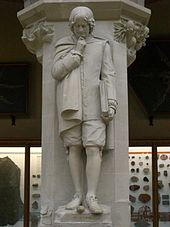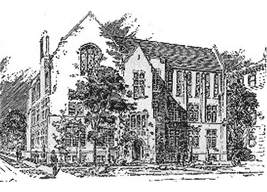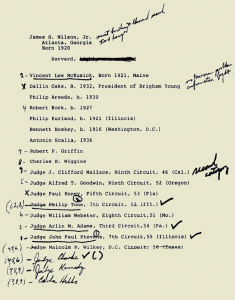 The editors of the blog asked several law school faculty to write about the people who have been the most formative figures in their careers as legal educators. This, the first submission in the series, is by Professor J. Gordon Hylton.
The editors of the blog asked several law school faculty to write about the people who have been the most formative figures in their careers as legal educators. This, the first submission in the series, is by Professor J. Gordon Hylton.
I left law school with no particular intention of becoming a law professor; however, when I did become one 10 years later, my views as to the proper purpose and content of legal education had been significantly shaped by my contact with a variety of individuals. Although I spent most of my first decade after law school in graduate school in History and American Studies and as a teacher of undergraduates, my experiences during those years clearly shaped my future approach to law teaching.
As a legal educator, I have been an advocate of the historical approach the study of law, and early on I had the good fortune to study under and work with a large number of exceptional historians, some of whom specialized in the history of law and some of whom did not.
This group included David Rankin and Thomas LeDuc at Oberlin College, G. Edward White, Chuck McCurdy, and Paul Gaston at the University of Virginia, and David Herbert Donald, Morton Horwitz, Bernard Bailyn, and Alan Brinkley of Harvard University. From all of these, and especially from Professor Donald, I learned that in law, as in everything else, an understanding of the past is a precondition for understanding the present.
The importance of casting the net wide enough to include cultural history in the study of law was brought home to me by my studies in the Harvard History of American Civilization program and especially by my association with Professors Daniel Aaron, Warner Berthoff, and Andrew Delbanco of the Harvard English Department.
I actually began thinking about a career in law teaching shortly after beginning graduate school, and toward that end I enrolled in a Harvard Law School course entitled “Preparing for Law Teaching” during my second year of graduate school. The class was ear-marked for LL.M. students interested in careers in legal education, and it was taught by former Harvard Law School Dean Albert Sacks. The course was conducted in seminar style, and each week a member of the Harvard Law School faculty offered a different class on some aspect of legal education.
While completing my Ph.D., I also served as a teaching assistant for Archibald Cox and briefly as a research assistant for Charles Haar, both distinguished legal scholars and members of the Harvard Law Faculty. Haar was an advocate of incorporating non-traditional historical materials (i.e., those not pertaining to estates in land and future interests) into the study of law, and Cox, of course, was legendary for his role in as the Watergate Special Prosecutor.
Although I didn’t become a law professor until several years later, my first experience as a teacher of law in a university environment came from 1980 to 1982 when I was a Lecturer in the undergraduate Legal Studies program at Brandeis University. Aping the instructional methods of law school, I led undergraduates through an introduction to the legal method based on the same sort of case-based analysis that is associated with the 1L year. In that position, I benefited greatly from my association with Professor Saul Touster, a former law professor who directed the Brandeis program (which was, interestingly enough, housed in the American Studies department).
Because my doctoral dissertation dealt with the development of the American legal profession in the era between the Civil War and the Great Depression, I also dealt regularly with issues pertaining to the history of legal education in my scholarly work. On one occasion, I also was asked to fill in for Professor Cox as the lecturer in his undergraduate course, “The Supreme Court and the Constitution.”
Outside of academia, my experiences as a law clerk for Justices Albertis Harrison and Lawrence I’Anson of the Virginia Supreme Court and my brief stints with the Massachusetts Commission Against Discrimination and the Harvard University General Counsel’s Office all gave me a much better sense of how legal principles and theories operate in the real world, certainly better than the sense that I had coming immediately out of law school.
I was also indirectly involved in legal education while I was in graduate school. In law school at the University of Virginia, I had served for a year as a student assistant to Albert Turnbull, the Dean of Admissions and Placement, and that experience had given me the opportunity to see how the administrative side of legal education operated from the inside. In a similar vein, while in graduate school I was for several years an undergraduate pre-law adviser at Harvard which required me to be knowledgeable about law schools in general and the law school admissions process in particular.
When I actually became a real law professor in 1987 at the Chicago-Kent College of Law, my approach to legal education and legal scholarship had been affected by all of the experiences discussed above. Moreover, my own studies of the history of legal education had convinced me that within the realm of “non-clinical” law schools courses, there were really three different types of courses—first year courses, upper level “doctrinal” courses, and “law and” courses (like legal history)—each with different goals and objectives.
The classroom teaching styles that I initially adopted were, I now realize, very much influenced by several of my teachers at the University of Virginia Law School, especially Tom Bergin (in first year courses), Charles Whitebread (upper level courses) and Ted White (legal history courses).
For teaching materials during the first part of my career, in which I taught only Property, Constitutional Law, and Legal and Constitutional History, I was very influenced by earlier experiences. For example, I used Charles Haar’s Property and Law in my first year Property class; I assigned Gunther’s famous Constitutional Law casebook (which Cox had used) in Constitutional Law, and I constructed my first Constitutional History seminar around Ted White’s The American Judicial Tradition.
During my first year of law teaching, I also benefitted enormously from the opportunity to engage in regular conversations about legal education with my new colleagues Ralph Brill and Randy Barnett. The fact that Ralph and Randy agreed on absolutely nothing in regard to legal education helped sharpen the discussions.
I was also much impressed by Northwestern Professor Anthony D’Amato’s article, “The Decline and Fall of Law Teaching in the Age of Student Consumerism,” which appeared in the Journal of Legal Education (37 J. Leg. Ed. 461 (1987)), during the semester that I began law teaching. Although I had already essentially reached the same conclusion, this article convinced me that the so-called Socratic Method, if used rigorously but fairly, was an extremely effective way of teaching first year law students.
Now 25 years into my law teaching career, I continue to draw upon my colleagues for insight and inspiration, and I learned long ago that the goal of high quality, meaningful legal education is a constantly moving target.
 The editors of the blog asked several law school faculty to write about the people who have been the most formative figures in their careers as legal educators. This is the second submission in the series, and it is by Professor John J. Kircher.
The editors of the blog asked several law school faculty to write about the people who have been the most formative figures in their careers as legal educators. This is the second submission in the series, and it is by Professor John J. Kircher.

